- Home
- Linda Nagata
The Year's Best Science Fiction & Fantasy 2013 Page 6
The Year's Best Science Fiction & Fantasy 2013 Read online
Page 6
Tonight, she thought. Under the eaves.
It was only when she turned, away from sun and sea, and began to cycle east, towards the towering edifice of Central Station, that it occurred to her—she had already made her decision. Even before she went to seek the old oracle’s help, she had made the choice.
Tonight, she thought, and her heart like a solar kite fluttered in anticipation, waiting to be set free.
Central Station rose out of the maze of old streets, winding roads, shops and apartment blocks and parking lots once abundant with cars powered by internal combustion engines. It was a marvel of engineering, a disaster of design, Futurist and Modernist, Gothic and Moorish, Martian and Baroque.
Others had designed it, but humans had embellished it, each competing to put their own contrasting signatures on the giant space port. It rose into the sky. High above, Reusable Launch Vehicles, old and new, came to land or took off to orbiting stations, and stratospheric planes came and went to Krung Thep and New York and Ulaan-Bataar, Sydney II and Mexico City, passengers coming and going, up and down the giant elevators, past levels full of shops and restaurants, an entire city in and of itself, before departing at ground level, some to Jaffa, some to Tel Aviv, the two cities always warily watching each other . . .
Mama Jones watched it, watched the passengers streaming out, she watched it wondering what it would be like to leave everything behind, to go into the station, to rise high, so high that one passed through clouds—what it would be like to simply leave, to somewhere, anywhere else.
But it passed. It always did. She watched the eaves of the station, those edges where the human architects went all out, even though they had a practical purpose, too, they provided shelter from the rain and caught the water, which were recycled inside the building—rain was precious, and not to be wasted.
Nothing should be wasted, she thought, looking up. The shop was being looked after, she had taken a few moments to take the short walk, to stretch her legs. She noticed the girl, Isobel, cycling past. Back from wherever she went. Pinged her a greeting, but the girl didn’t stop. Youth. Nothing should be wasted, Mama Jones thought, before turning away. Not even love. Most of all, love.
“How is your father?”
Boris Chong looked up at her. He was sitting at a table by the bar, sipping a Martian Sunset. It was a new drink to Miriam. Boris had taught it to her . . .
It was still strange to her that he was back.
“He’s . . . ” Boris struggled to find the words. “Coping,” he said at last. She nodded.
“Miriam—”
She could almost not remember a time she had been Miriam. For so long she had been Mama Jones. But Boris brought it back to her, the name, a part of her youth. Tall and gangly, a mixture of Russian Jews and Chinese labourers, a child of Central Station just as she was. But he had left, had gone up the elevators and into space, to Tong Yun on Mars, and even beyond . . .
Only he was back, now, and she still found it strange. Their bodies had become strangers to each other. And he had an aug, an alien thing bred out of long-dead microscopic Martian life-forms, a thing that was now a part of him, a parasite growth on Boris’ neck, inflating and deflating with the beats of Boris’ heart . . .
She touched it, tentatively, and Boris smiled. She made herself do it, it was a part of him now, she needed to get used to it. it felt warm, the surface rough, not like Boris’ own skin. She knew her touch translated as pleasure in both the aug and Boris’ mind.
“What?” she said.
“I missed you today.”
She couldn’t help it. She smiled. Banality, she thought. We are made so happy by banalities.
We are made happy by not being alone, and by having someone who cares for us.
She went around the counter. Surveyed her small domain. Chairs and tables, the tentacle-junkie in the corner in his tub, smoking a sheesha pipe, looking sleepy and relaxed. The ancient bead curtain instead of a door. A couple of workers from the station sipping arak, mixing it with water, the drink in the glass turning opaque, the colour of milk.
Mama Jones’ Shebeen.
She felt a surge of contentment, and it made the room’s edges seem softer.
Over the course of the day the sun rose behind the space port and traced an arc across it until it landed at last in the sea. Isobel worked inside Central Station and didn’t see the sun at all.
The Level Three concourse offered a mixture of food courts, drone battle-zones, game-worlds, Louis Wu emporiums, nakamals, smokes bars, truflesh and virtual prostitution establishments, and a faith bazaar.
Isobel had heard the greatest faith bazaar was in Tong Yun City, on Mars. The one they had on Level Three here was a low key affair—a Church of Robot mission house, a Gorean temple, an Elronite Centre For The Advancement of Humankind, a mosque, a synagogue, a Catholic church, an Armenian church, an Ogko shrine, a Theravada Buddhist temple, and a Baha’i temple.
On her way to work Isobel went to church. She had been raised Catholic, her mother’s family, themselves Chinese immigrants to the Philippines, having adopted that religion in another era, another time. Yet she could find no comfort in the hushed quietude of the spacious church, the smell of the candles, the dim light and the painted glass and the sorrowful look of the crucified Jesus.
The church forbids it, she thought, suddenly horrified. The quiet of the church seemed oppressive, the air too still. It was as if every item in the room was looking at her, was aware of her. She turned on her heels.
Outside, not looking, she almost bumped into Brother Patch-It.
“Girl, you’re shaking,” R. Patch-It said, compassion in his voice. Like most followers of the Church of Robot, once he’d taken on the robe—so to speak—he had shed his former ident tag and taken on a new one. Usually they were synonyms of “fix.” She knew R. Patch-It slightly, he had been a fixture of Central Station (both space port and neighbourhood) her entire life, and the part-time moyel for the Jewish residents in the event of the birth of a baby boy.
“I’m fine, really,” Isobel said. The robot looked at her from his expressionless face. ‘Robot’ was male in Hebrew, a gendered language. And most robots had been fashioned without genitalia or breasts, making them appear vaguely male. They had been a mistake, of sort. No one had produced robots for a very long time. They were a missing link, an awkward evolutionary step between human and Other.
“Would you like a cup of tea?” the robot said. “Perhaps cake? Sugar helps human distress, I am told.” Somehow R. Patch-It managed to look abashed.
“I’m fine, really,” Isobel said again. Then, on an impulse: “Do you believe that . . . can robots . . . I mean to say—”
She faltered. The robot regarded her with his old, expressionless face. A rust scar ran down one cheek, from his left eye to the corner of his mouth. “You can ask me anything,” the robot said, gently. Isobel wondered what dead human’s voice had been used to synthesise the robot’s own.
“Do robots feel love?” she said.
The robot’s mouth moved. Perhaps it was meant as a smile. “We feel nothing but love,” the robot said.
“How can that be? How can you . . . how can you feel?” she was almost shouting. But this was Third Level, no one paid any attention.
“We’re anthropomorphised,” R. Patch-It said, gently. “We were fashioned human, given physicality, senses. It is the tin man’s burden.” His voice was sad. “Do you know that poem?”
“No,” Isobel said. Then, “What about . . . what about Others?”
The robot shook his head. “Who can tell,” he said. “For us, it is unimaginable, to exist as a pure digital entity, to not know physicality. And yet, at the same time, we seek to escape our physical existence, to achieve heaven, knowing it does not exist, that it must be built, the world fixed and patched . . . but what is it really that you ask me, Isobel daughter of Irina?”
“I don’t know,” she whispered, and she realised her face was wet. “The church—” he
r head inching, slightly, at the catholic church behind them. The robot nodded, as if it understood.
“Youth feels so strongly,” the robot said. His voice was gentle. “Don’t be afraid, Isobel. Allow yourself to love.”
“I don’t know,” Isobel said. “I don’t know.”
“Wait—”
But she had turned away from Brother Patch-It. Blinking back the tears—she didn’t know where they came from—she walked away, she was late for work.
Tonight, she thought. Tonight, under the eaves. She wiped away the tears.
With dusk a welcome coolness settled over Central Station. In Mama Jones’ shebeen candles were lit and, across the road, the No-Name Nakamal was preparing the evening’s kava, and the strong, earthy smell of it—the roots peeled and chopped, the flesh minced and mixed with water, squeezed repeatedly to release its very essence, the kavalactones in the plant—the smell filled the paved street that was the very heart of the neighbourhood.
On the green, robotniks huddled together around a makeshift fire in an upturned drum. Flames reflected in their faces, metal and human mixed artlessly, the still-living debris of long-gone wars. They spoke amidst themselves in that curious Battle Yiddish that had been imprinted on them by some well-meaning army developer—a hushed and secret language no one spoke any more, ensuring their communications would be secure, like the Navajo Code Talkers in the second world war.
On top of Central Station graceful RLVs landed or took off, and on the roofs of the neighbourhood solar panels like flowers began to fold, and residents took to the roofs, those day-time sun-traps, to drink beer or kava or arak, to watch the world below, to smoke a sheesha pipe and take stock of the day, to watch the sun set in the sea or tend their rooftop gardens.
Inside Central Station the passengers dined and drank and played and worked and waited—Lunar traders, Martian Chinese on an Earth holiday package tour, Jews from the asteroid-kibbutzim in the Belt, the hurly burly of a humanity for whom Earth was no longer enough and yet was the centre of the universe, around which all planets and moons and habitats rotated, an Aristotelian model of the world superseding its one-time victor, Copernicus. On Level Three Isobel was embedded inside her work pod, existing simultaneously, like a Schrödinger’s Cat, in physical space and the equally real virtuality of the Guilds of Ashkelon universe, where—
She was the Isobel Chow, Captain of the Nine Tailed Cat, a starship thousands of years old, upgraded and refashioned with each universal cycle, a salvage operation she, Isobel, was captain and commander of, hunting for precious games-world artefacts to sell on the Exchange—
Orbiting Black Betty, a Guilds of Ahskelon universal singularity, where a dead alien race had left behind enigmatic ruins, floating in space in broken rocks, airless asteroids of a once-great galactic empire—
Success there translating to food and water and rent here—
But what is here, what is there—
Isobel Schrödingering, in the real and the virtual—or in the GoA and in what they call Universe-1—and she was working.
Night fell over Central Station. Lights came alive around the neighbourhood then, floating spheres casting a festive glow. Night was when Central Station came alive . . .
Florists packing for the day in the wide sprawling market, and the boy Kranki playing by himself, stems on the ground and wilting dark Lunar roses, hydroponics grown, and none came too close to him, the boy was strange, he had nakaimas.
Asteroid pidgin around him as he played, making stems rise and dance before him, black rose heads opening and closing in a silent, graceless dance before the boy. The boy had nakaimas, he had the black magic, he had the quantum curse. Conversation flowing around him, traders closing for the day or opening for the night, the market changing faces, never shutting, people sleeping under their stands or having dinner, and from the food stalls the smells of frying fish, and chilli in vinegar, of soy and garlic frying, of cumin and turmeric and the fine purple powder of sumac, so called because it looks like a blush. The boy played, as boys would. The flowers danced, mutely.
—Yu stap go wea? Where are you going?
—Mi stap go bak long haos. I am going home.
—Yu no save stap smoltaem, dring smolsmol bia? Won’t you stop for a small beer?
Laughter. Then—Si, mi save stap smoltaem.
Yes, I could stop for a little while.
Music playing, on numerous feeds and live, too—a young kathoey on an old acoustic guitar, singing, while down the road a tentacle junkie was beating time on multiple drums, adding distortions in real-time and broadcasting, a small voice weaving itself into the complex unending pattern of the Conversation.
—Mi lafem yu!
—Awo, yu drong!
Laughter, I love you—You’re drunk!—a kiss, the two men walk away together, holding hands—
—Wan dei bae mi go long spes, bae mi go lukluk olbaot long ol star.
—Yu kranki we!
One day I will go to space, I will go look around all the planets—
You’re crazy!
Laughter, and someone dropping in from virtuality, blinking sleepy eyes, readjusting, someone turns a fish over on the grill, someone yawns, someone smiles, a fight breaks out, lovers meet, the moon on the horizon rises, the shadows of the moving spiders flicker on the surface of the moon.
Under the eaves. Under the eaves. Where it’s always dry where it’s always dark, under the eaves.
There, under the eaves of Central Station, around the great edifice, was a buffer zone, a separator between space port and neighbourhood. You could buy anything at Central Station and what you couldn’t buy you could get there, in the shadows.
Isobel had finished work, she had come back to Universe-1, had left behind captainhood and ship and crew, climbed out of the pod, and on her feet, the sound of her blood in her ears, and when she touched her wrist she felt the blood pulsing there, too, the heart wants what the heart wants, reminding us that we are human, and frail, and weak.
Through a service tunnel she went, between floors, and came out on the north-east corner of the port, facing the Kibbutz Galuyot road and the old interchange.
It was quiet there, and dark, few shops, a Kingdom of Pork and a book binder and warehouses left from days gone by, now turned into sound-proofed clubs and gene clinics and synth emporiums. She waited in the shadow of the port, hugging the walls, they felt warm, the station always felt alive, on heat, the station like a heart, beating. She waited, her node scanning for intruders, for digital signatures and heat, for motion—Isobel was a Central Station girl, she could take care of herself, she had a heat knife, she was cautious but not afraid of the shadows.
She waited, waited for him to come.
“You waited.”
She pressed against him. He was warm, she didn’t know where the metal of him finished and the organic of him began.
He said, “You came,” and there was wonder in the words.
“I had to. I had to see you again.”
“I was afraid.” His voice was not above a whisper. His hand on her cheek, she turned her head, kissed it, tasting rust like blood.
“We are beggars,” he said. “My kind. We are broken machines.”
She looked at him, this old abandoned soldier. She knew he had died, that he had been remade, a human mind cyborged onto an alien body, sent out to fight, and to die, again and again. That now he lived on scraps, depending on the charity of others . . .
Robotnik. That old word, meaning worker. But said like a curse.
She looked into his eyes. His eyes were almost human.
“I don’t remember,” he said. “I don’t remember who I was, before.”
“But you are . . . you are still . . . you are!” she said, as though finding truth, suddenly, and she laughed, she was giddy with laughter and happiness and he leaned and he kissed her, gently at first and then harder, their shared need melding them, Joining them almost like a human is bonded to an Other.
; In his strange obsolete Battle Yiddish he said, “Ich lieba dich.”
In asteroid pidgin she replied.
—Mi lafem yu.
His finger on her cheek, hot, metallic, his smell of machine oil and gasoline and human sweat. She held him close, there against the wall of Central Station, in the shadows, as a plane high overhead, adorned in light, came in to land from some other and faraway place.
Honey Bear
Sofia Samatar
We’ve decided to take a trip, to see the ocean. I want Honey to see it while she’s still a child. That way, it’ll be magical. I tell her about it in the car: how big it is, and green, like a sky you can wade in.
“Even you?” she asks.
“Even me.”
I duck my head to her hair. She smells fresh, but not sweet at all, like parsley or tea. She’s wearing a little white dress. It’s almost too short. She pushes her bare toes against the seat in front of her, knuckling it like a cat.
“Can you not do that, Hon?” says Dave.
“Sorry, Dad.”
She says “Dad” now. She used to say “Da-Da.”
Dave grips the wheel. I can see the tension in his shoulders. Threads of gray wink softly in his dark curls. He still wears his hair long, covering his ears, and I think he’s secretly a little bit vain about it. A little bit proud of still having all his hair. I think there’s something in this, something valuable, something he could use to get back. You don’t cling to personal vanities if you’ve given up all hope of a normal life. At least, I don’t think you do.
“Shit,” he says.
“Sweetheart . . . ”
He doesn’t apologize for swearing in front of Honey. The highway’s blocked by a clearance area, gloved hands waving us around. He turns the car so sharply the bags in the passenger seat beside him almost fall off the cooler. In the back seat, I lean into Honey Bear.
“It’s okay,” I tell Dave.
“No, Karen, it is not okay. The temp in the cooler is going to last until exactly four o’clock. At four o’clock, we need a fridge, which means we need a hotel. If we are five minutes late, it is not going to be okay.”

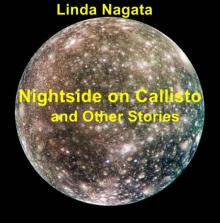 Nightside on Callisto and Other Stories
Nightside on Callisto and Other Stories Pacific Storm
Pacific Storm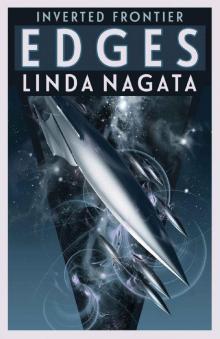 Edges
Edges The Red
The Red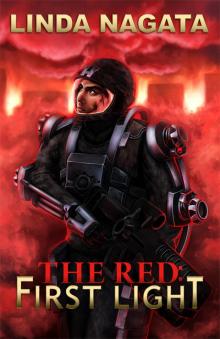 The Red: First Light
The Red: First Light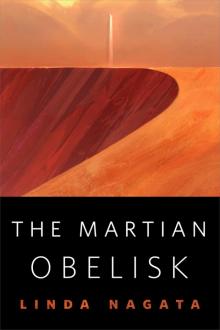 The Martian Obelisk
The Martian Obelisk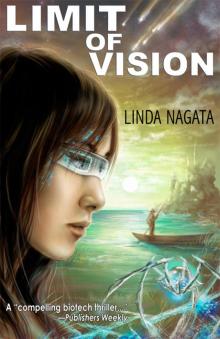 Limit of Vision
Limit of Vision Going Dark
Going Dark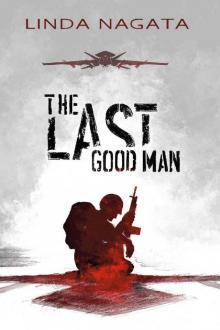 The Last Good Man
The Last Good Man The Trials (The Red Trilogy Book 2)
The Trials (The Red Trilogy Book 2)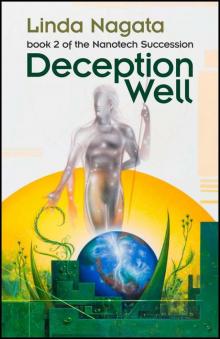 Deception Well (The Nanotech Succession Book 2)
Deception Well (The Nanotech Succession Book 2)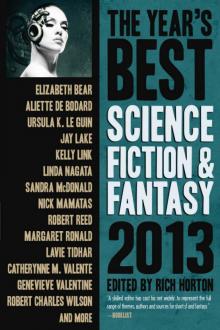 The Year's Best Science Fiction & Fantasy 2013
The Year's Best Science Fiction & Fantasy 2013 The Dread Hammer
The Dread Hammer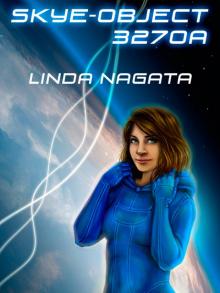 Skye Object 3270a
Skye Object 3270a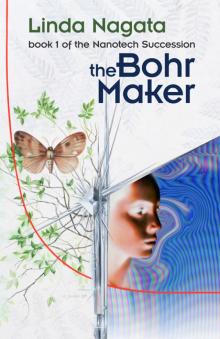 The Bohr Maker
The Bohr Maker